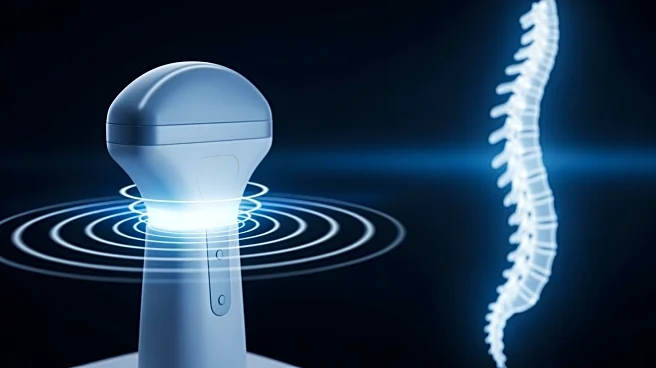What's Happening?
Recent studies have explored the use of low-intensity focused ultrasound (LIFU) for neuromodulation of the spinal cord to control blood pressure. The research involved advanced imaging setups to ensure
precise targeting of the spinal cord, utilizing a coaxial imaging probe housed within a 3D-printed FUS cone. The study was conducted on animal models, including rats and pigs, to evaluate the effectiveness of LIFU in modulating mean arterial pressure (MAP). The experiments adhered to strict protocols approved by the Johns Hopkins University Animal Care and Use Committee, ensuring compliance with ethical standards. The findings suggest that LIFU can effectively target the spinal cord to modulate blood pressure, offering potential clinical applications for managing hypertension.
Why It's Important?
The use of LIFU for spinal cord neuromodulation represents a significant advancement in non-invasive techniques for blood pressure management. This approach could provide an alternative to traditional pharmacological treatments, potentially reducing side effects associated with long-term medication use. The ability to precisely target the spinal cord and modulate blood pressure could lead to new therapeutic strategies for patients with hypertension, improving quality of life and reducing healthcare costs. Furthermore, the research highlights the potential for ultrasound technology to be applied in other areas of neuromodulation, expanding its clinical utility.
What's Next?
Future research will likely focus on refining the parameters of LIFU stimulation to optimize its efficacy and safety for human applications. Clinical trials may be initiated to assess the feasibility of this technique in patients with hypertension. Additionally, researchers may explore the use of LIFU for neuromodulation in other physiological systems, potentially broadening its therapeutic scope. Collaboration between medical institutions and technology developers will be crucial in advancing this promising field.
Beyond the Headlines
The ethical implications of using LIFU for neuromodulation warrant careful consideration, particularly regarding long-term effects and accessibility. As this technology progresses, it will be important to address potential disparities in access to advanced medical treatments. Moreover, the integration of LIFU into clinical practice will require comprehensive training for healthcare professionals to ensure safe and effective application.









